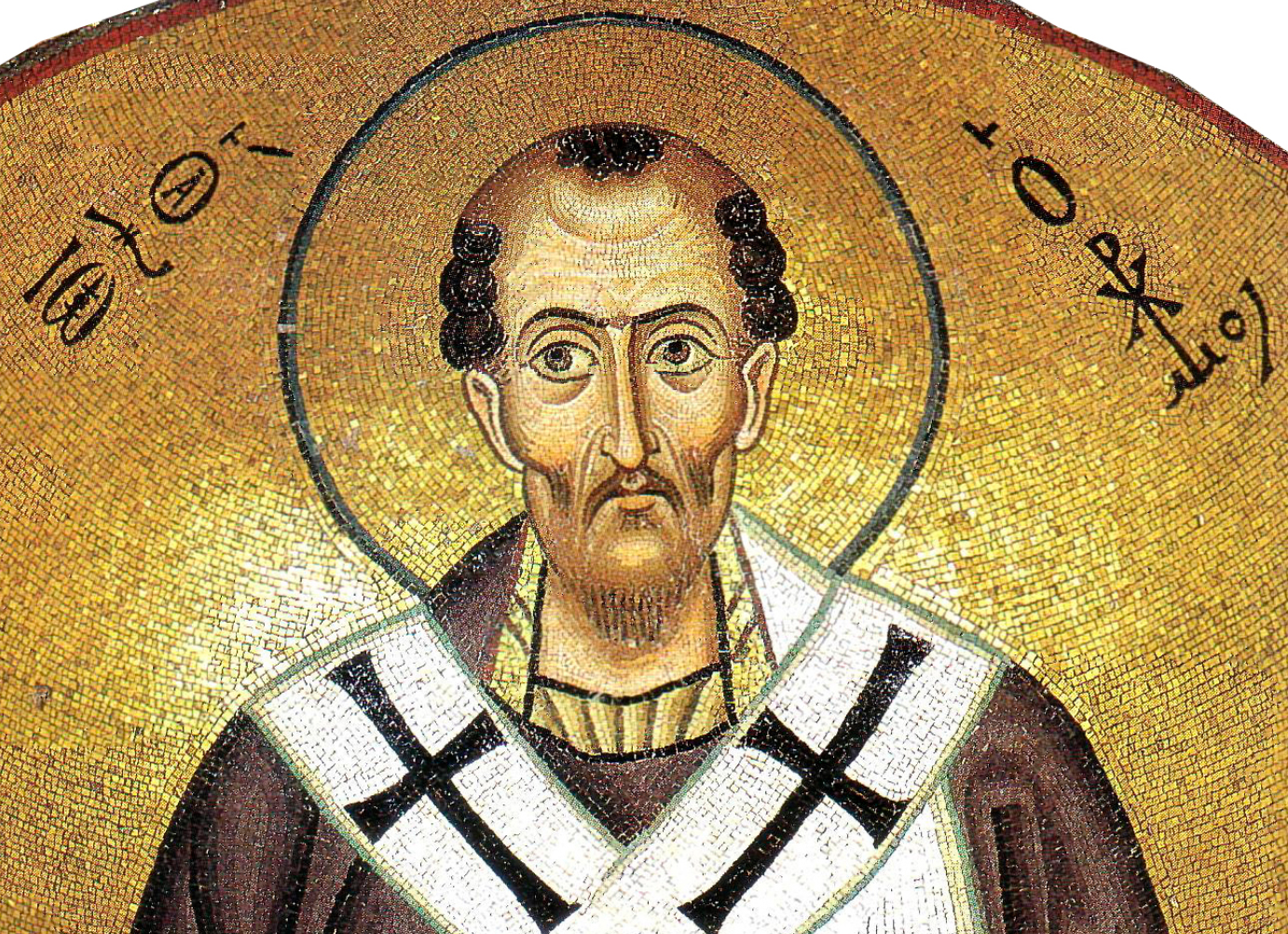
2021至今,伦敦大学亚非学院(SOAS)在读博士 2019-2020,波士顿学院,神学硕士,主修叙利亚传统 2015-2018,波士顿圣十字架希腊正教神学院,主修希腊教父灵修。
Excerpt from translation: John Chrysostom's Letter on the Prayer of Jesus
Note: The book was written at least in the 11th century, or even earlier; St. Peter of Damascus in the 12th century mentioned this work of John Chrysostom [1]. This work is also quoted in the 14th-century book of St Callisto and Ignatius (Καλλιστος και Ιγνατιος) concerning the quiet life and the monastic state. Nicodemus followed this tradition. According to the study of Panayiotis Nikolopoulos[2], he believes that the Letter on the Prayer of Jesus is the work of John Chrysostom and contains two manuscript traditions: Letter to an Abbot ῾Επιστολή πρός ἡγούμενον) and Letter to Monks Ἐπιστολή προς μοναχούς. The latter manuscripts are in the fourteenth and fifteenth centuries, there are traces of editing, the latter is obviously based on the former, while the former has about 40 manuscripts, the earliest is the manuscript of the 11th century [3]. Since the manuscript is almost at the same time as the new theologian Simon's book "The Three Methods of Prayer", the tutor Maxim guessed that the letter came from the circle of the new theologian Simon, or one of his disciples. The tutor Maxim pointed out that according to the current historical methodology, this is a work in name, but according to the church tradition's recognition of the truth conveyed by the letter, the author of the letter has reached the same or similar level as John Chrysostom. , so the devotional tradition of the church unanimously endorses this devotional work. [4]
For example:
- This book references Constas, Maximos and Chamberas, Peter A. trans. St. John Chrysostom and the Jesus Prayer (Columbia, Missouri: Newrome Press, 2019), 2-45.
[This book is from the Greek original on one page, and the folded pages are translated in English. The English translator edited the Greek original and added footnotes to the English translation. The Chinese translation also refers to a lot of footnotes in the English translation. Chinese readers added their own notes]
- Thanks to Sister Ellie for editing, this edition has been slightly revised by the translator. All errors are attributed to the translator, and readers are welcome to participate in the process of refining the translation for early publication.
- Copyright statement: If the media or self-media considers reprinting this translation, the author of the translator is required. Please reply through the website platform, or email (areopagusworkshop@gmail.com) or WeChat (ajia835828).
- [] is added by the translator to clarify the meaning of the sentence. ( ) will be accompanied by the original Greek, or the original English. If there is a translator, the word will be added.
- The sources of the New Testament of the Bible are quoted in the Combined Version, or according to the literal translation of the original Greek. All references to the Old Testament are translated according to the Septuagint.

John Chrysostom's Letter on the Prayer of Jesus
Translated by: Yuan Yongjia
Editor: Don Ellie
text
Here is a letter from our Holy Father John Chrysostom to an abbot who, for the benefit of himself and his colleagues, begged St. John Chrysostom to teach them some spiritual principles.
1. My dear brother, you wrote to me asking me to give you a guideline for spiritual practice, but I do not know what I should write. May Jesus Christ, the Lord of glory (1 Corinthians 2:8; James 2:1) be your guide, as long as you sincerely give yourself to the Lord God with your fellow brothers; as long as you diligently[5] willingly "leave Father's house, family", leaving all possessions and the glory of the whole world - for unless a man leaves all that he has (Luke 9:25; 14:26), and does not die to the world (cf. 6:14), he cannot be the master disciples (Luke 14:33); as long as you love the Lord your God with all your heart and your neighbor as yourself (Mark 12:30; Luke 10:27; cf. Deuteronomy 6:5); as long as you remain chaste in body and mind until you die (cf. 1 Thessalonians 5:23; 1 Corinthians 1:8); as long as each of you has compassion and sympathy in your heart, and prepares yourselves like lamps to meet the Bridegroom in heaven (Matt. 25:1-4), and at critical moments (i.e. When he comes again), the lamp of each of you has not been extinguished—for if a man keeps his body pure, but under a bright exterior, that is, his heart, is full of every wickedness, hatred, resentment, anger, envy and pride (cf. Matt. 23:25; Luke 11:39), what good can he gain (Mark 8:36; Luke 9:25)? According to the Bible, anyone who is only angry with a brother is walking in darkness and is considered a murderer. (See Matthew 23:25; 1 John 2:9; 3:15)
2. If anyone thinks that what I have written is inappropriate (see 2 Timothy 4:2), let him think of the parable of the ten virgins. According to the Bible, five are wise, and the other five, though not prostitutes, are foolish, because their bodily chastity is of no use to them. (Matt 25:1-13) Their hearts were not filled with mercy and love for their brethren, but full of wickedness and malice, so they were shut out of the heavenly and ineffable bridal chamber, crying, "Lord O Lord, open the door for us." But the Lord of glory no longer rewarded them, but rejected them and said, "I do not know you." And only merciless punishment. So now is the time to pray, now is the time to be free from sin - whatever burdens you bind in this life will carry over to the next.
…
9. I urge you, my son, to imitate the humility of the Lord, which Christ manifested in himself, when he "humbled himself, and became obedient unto death, even the death of the cross (Philippians 2:8)", so he Do it to be an example to us so that we can overcome the pride of the devil in humility. The Lord also speaks of humility: "Whoever wants to be first will be your servant. The last of all, and the servant of all." (Matt. 20:27; Mark 9:35; 10:44)" will be humbled (Luke 14:11), and he who humbles himself will not fall, because he puts himself under all things, but he who exalts himself will be cast into everlasting fire (cf. Mark 9 : 48; Revelation 19:20).
10. My son, I urge you to be merciful. I entreat you to cry while there is still today, lest we cry "there", for there you will gnash your teeth, where the worm does not sleep nor rest, where the unquenchable fire flows like a river, where the angels are cruel and ruthless. . They have no right to show mercy, or honor elders, or pardon, or honor kings, and each one is judged without exception for what he has done.
…
14. Run away from those who are called "wise men" who read a lot without any benefit, but ruin those who listen to them. Do not absorb the venom of snakes by your ears[6], and do not try to read many books, but rather read a short passage and [do it] well, so that grace will be given to those who listen to it. [Reading] Studying is worse than praying and crying a lot. Because it supports your heart and guards your soul, but reading a lot makes the soul proud.
…
16. We are to imitate the saints. They endured starvation, lack of clothing and cold, through water, fire and sword, and willingly endured all hardships and trials, and we will imitate them to the death. You may want to live prosperously[7] in all things, but this is not the will of God.
17. When there is no anger or distraction, pray without ceasing. Because every thought separates the mind from God, even a seemingly good thought is totally evil, but I don't say it comes from the devil. The devil's sole purpose is to keep the heart away from God, and he quietly casts commands, good deeds, and specious delusions upon the heart, and we are to completely ignore these proposals. For the whole battle of the devil is to turn the mind away from God, away from God, to pursue worldly pleasures. And the whole battle of the soul consists in keeping the soul [for a moment] from leaving God, not being narcissistic (not sparing oneself), not pandering to evil thoughts; not paying attention to "the old painters", and "following [8] all things" - the devil , or image, or state [9], or appearance, or figure drawn in our minds. After that, the devil changed form, making poor human think he was somewhere other than where he actually stood. The poor man was deceived, imagining himself or seeing visions, or conversing with people, or being sent to do all sorts of things--these are all deceptions of the devil.
…
Seek the mercy of the Lord with humility and contrite heart, from morning till night, if possible, all night long (Acts 28:23), saying without ceasing: "Lord Jesus Christ, Son of God, have mercy on me. Lord Jesus Christ, have mercy on me. , Son of God, have mercy on me. Lord Jesus Christ, Son of God, have mercy on me. Amen."
19. Therefore, I urge you, to force yourselves, and I say again, to force your mind [to do this] to the last breath. This work requires much force, for the narrow and difficult way leads to the gate of eternal life, and he who strives and compels himself will enter. The kingdom of heaven is entered by force. [10] (cf. Matt. 7:14; 11:12)
Excerpts finished
If you are moved to appreciate and support this work, please scan the code and add WeChat

[1] Philokalia , Vol.3 (Athens: Aster-Papademetriou, 1957), 11, lines 16-18. For the English translation, see Vol. III, p. 81.
[2] Panayiotis Nikolopoulos, Αἱ Εἰς Τον Ἱωάννην Τον Χρυσόστομον Ἐσφαλμένως Ἀποδιδόμεναι Ἐπιστολαί (Athens: GK Tsiberiotis, 1973). See GK Tsiberiotis, 1973 for the Greek translation of the teacher, pages 27-12.
[3] Maximos Constas and Peter Chamberas, eds., St. John Chrysostom and the Jesus Prayer (Columbia, Missouri: Newrome Press, 2019), xxiv-xxv; 手稿目录见于:Nikolopoulos, Αἱ Εἰς Τον Ἱωάννην Τον Χρυσόστομον Ἐσφαλμένως Ἀποδιδόμεναι Ἐπιστολαί , 176-203.
[4] See Constas and Chamberas, St. John Chrysostom and the Jesus Prayer , xxxvi-xxxvii.
[5] ἀθλητικῶς, literally a place of exercise. This refers to an ancient Greek competitive sport where athletes had to play naked to win or lose.
[6] For Eve's suggestion of "listening" to the serpent, see: Maximos Constas, Proclus of Constantinople and the Cult of the Virgin in Late Antiquity (Leiden and Boston: Brill, 2003), 273-313.
[7] Literally, without hardship.
[8] See "The Words and Deeds of the Desert Fathers": "Our minds are like painters, old or new (οἱ παλαιοί καί νέοι ζωγράφοι εἰσίν οἱ λογισμοί μου." (PG 65:253 line 10). πανταμίμητος (one who imitates all things) Extremely rare in Greek texts, παντομίμητος appears only in a slightly different way in Macarian homily 54.4 (GCS II:256, line 1). This may indicate that this letter was Influenced by the Macario tradition.
[9] τρόπους Literally translated as manner, appearance, state.
[10] Βιαστῶν and βίας both mean violence, force, coercion. This is how the Greek Fathers understood the word. It is more powerful than mere effort, which is to force yourself to do it even if you don't want to. This is the true meaning of the word. The unwillingness here is, of course, not the unwillingness of the mind, but the unwillingness caused by the weakness of the flesh and our old man, that is, bad habits.
Like my work?
Don't forget to support or like, so I know you are with me..
Comment…